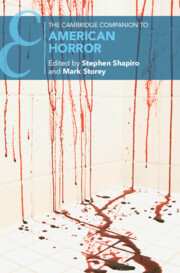Book contents
- The Cambridge Companion to American Horror
- The Cambridge Companion to American Horror
- Copyright page
- Contents
- Acknowledgments
- Contributors
- Introduction
- Part I Histories
- 1 Slavery
- 2 Capitalism
- 3 Religion and Spirituality
- 4 Settlement and Imperialism
- 5 Censorship and State Regulation
- 6 Schlock, Kitsch, and Camp
- Part II Genres
- Index
- Cambridge Companions To …
- References
4 - Settlement and Imperialism
from Part I - Histories
Published online by Cambridge University Press: 21 July 2022
- The Cambridge Companion to American Horror
- The Cambridge Companion to American Horror
- Copyright page
- Contents
- Acknowledgments
- Contributors
- Introduction
- Part I Histories
- 1 Slavery
- 2 Capitalism
- 3 Religion and Spirituality
- 4 Settlement and Imperialism
- 5 Censorship and State Regulation
- 6 Schlock, Kitsch, and Camp
- Part II Genres
- Index
- Cambridge Companions To …
- References
Summary
This chapter shows how, from Charles Brockden Brown’s Edgar Huntly to Jeff Barnaby’s Blood Quantum, American horror erupts out of the violence performed on indigenous people by white settler society, on people and land on the slavery plantation, and on citizens in the Global South and Middle East during period when the United States has extended and protected American global hegemony. By reading American colonialism and neo-imperialism as central to American extractivist capitalism, the chapter reveals how American horror also narrates the devastating violence done to the planet itself. The chapter observes that much American horror produced by and for white settler society represents settler violence against people and land as justified and regenerative, but it also discusses a number of less reactionary texts that make plain the horrific violence inherent in the capitalist colonial project.
Keywords
- Type
- Chapter
- Information
- The Cambridge Companion to American Horror , pp. 60 - 75Publisher: Cambridge University PressPrint publication year: 2022

